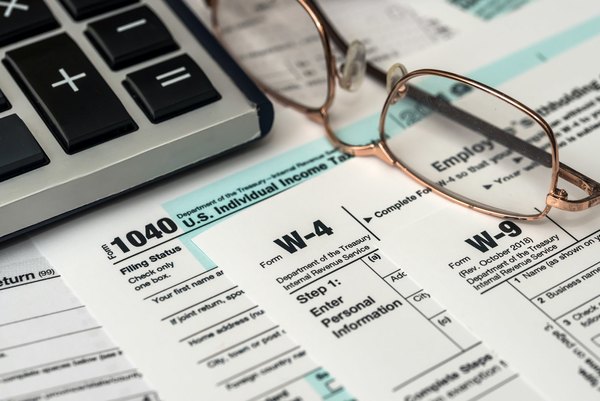Most people can file on their own, but there are things to consider before doing your own taxes.
Tax time is almost upon us, which leaves many of asking, should I do my own taxes or hire an accountant? Millions of taxpayers ask themselves this question every year and for good reason. With the constantly changing tax law, it makes sense that taxpayers are worried that they may do something wrong.
So how do you know the answer to ‘Do I need my own accountant?’ or ‘Can I do my own taxes?’. Check out our tips below.
What’s Your Job Situation?
The first thing to consider is your job situation. For example, if you had one job and take the standard deduction, it can be easy to do your own taxes. If you had multiple jobs, were issued a few 1099s and have complex tax write-offs, hiring someone to help you may be a better choice.
Taxpayers that work on commission, are self-employed, or worked side gigs as a freelancer may want to let an accountant do their taxes. The accountant will be more likely to know about many more deductions and write-offs you are entitled to given your specific employment situation.
Do you Have Investments?
Investments have tax consequences and the laws can be complex. If you have anything other than retirement investments, you may want to consider hiring an accountant. Retirement investments may offer tax write-offs, but they are fairly straightforward – you can deduct up to $6,000 from your income. If you invest in a Roth IRA, there are no deductions since you take the tax benefits during retirement, allowing your earnings to grow tax-free.
Any other investments, including stocks and real estate, may trigger capital gains and complex tax calculations that are best left to an accountant.
Do You Own Your Own Business?
If you work out of your home, you may be eligible for a good deal of deductions including the home office deduction, but again, it’s complicated. You may only deduct the expenses for the portion of your home that you use exclusively for your business. For example, if your office is run at your kitchen table, you can’t deduct the expenses for it because chances are you use your kitchen for personal use too.
If you are able to take the home office deduction, it may include a portion of your mortgage interest, utilities, insurance, repair and maintenance costs. An accountant that understands the home office deduction can walk you through the possibilities as well as let you know how taking the deduction now affects you when you sell the home.
Are you Taking the Standard Deduction?
The Tax Cuts and Jobs Act made it more likely that most taxpayers will take the standard deduction. This tax year, the deduction is $12,200 for single filers and $24,400 for married filing joint taxpayers. If your itemized deductions don’t exceed this amount, you can take the standard deduction, simplify your taxes and prepare them yourself.
If you have itemized deductions that exceed this amount, you may want to consider using an accountant. Taking the deductions requires adequate proof of the expense and complex calculations, and puts you at a higher risk of being subjected to an audit. An accountant is more likely to know which deductions may be more likely to trigger an audit.
Do You Own Investment Real Estate?
Investment real estate is a great way to diversify your portfolio, but it’s also a great way to complicate your tax returns. You’ll pay taxes on capital gains earned from appreciation as well as the profits earned from rental income. However, you may also be eligible for a variety of deductions. An accountant can help you gather the information needed for the expenses and help you understand how your taxes are affected. This is especially important if you sell the rental property and earn capital gains.
Did Your Lifestyle Change?
Getting married, getting divorced, or having a child all change the landscape of your tax filings. While they don’t necessarily complicate things, your tax return is different. It may be a good idea to at least use an accountant for the first year of your different lifestyle to see the differences in filing.
Things to Know About Hiring an Accountant
Before you hire an accountant to do your taxes, consider what you should look for in this professional:
- What type of experience do they have? Have they prepared taxes for situations like yours before? Give specific examples of your income, such as investment real estate, overseas income, or home office deductions and see what type of experience they have.
- What are the costs? Of course, it costs money to hire a professional to do your taxes. Some tax professionals manage just basic tax returns and charge a nominal fee, while others charge excessive fees but deal with much more complex tax situations.
- What do others think? Ask around to get referrals from people that have used an accountant to prepare their taxes before. Ask about their experience and gauge how it is similar to yours. For example, if you know a fellow real estate investor and he loves his accountant, consider starting there.
- What type of certification do they have? Look for accountants with certification. A CPA is educated in many aspects of accounting including tax accounting, whereas an EA, is specifically trained in tax accounting.
If you decide to file the taxes yourself, you need to figure out how to do it. The IRS offers free tax filing for basic tax situations. If you don’t meet the requirements, you’ll need to use tax software, such as Intuit TurboTax or H&R Block that can handle your situation. Shop around for the perfect software that will allow you to file the type of taxes you need to file given your income, deductions, and lifestyle.







